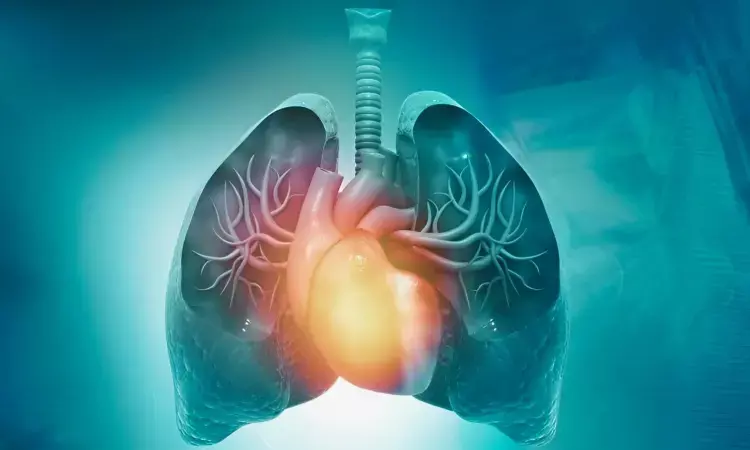- Home
- Medical news & Guidelines
- Anesthesiology
- Cardiology and CTVS
- Critical Care
- Dentistry
- Dermatology
- Diabetes and Endocrinology
- ENT
- Gastroenterology
- Medicine
- Nephrology
- Neurology
- Obstretics-Gynaecology
- Oncology
- Ophthalmology
- Orthopaedics
- Pediatrics-Neonatology
- Psychiatry
- Pulmonology
- Radiology
- Surgery
- Urology
- Laboratory Medicine
- Diet
- Nursing
- Paramedical
- Physiotherapy
- Health news
- Fact Check
- Bone Health Fact Check
- Brain Health Fact Check
- Cancer Related Fact Check
- Child Care Fact Check
- Dental and oral health fact check
- Diabetes and metabolic health fact check
- Diet and Nutrition Fact Check
- Eye and ENT Care Fact Check
- Fitness fact check
- Gut health fact check
- Heart health fact check
- Kidney health fact check
- Medical education fact check
- Men's health fact check
- Respiratory fact check
- Skin and hair care fact check
- Vaccine and Immunization fact check
- Women's health fact check
- AYUSH
- State News
- Andaman and Nicobar Islands
- Andhra Pradesh
- Arunachal Pradesh
- Assam
- Bihar
- Chandigarh
- Chattisgarh
- Dadra and Nagar Haveli
- Daman and Diu
- Delhi
- Goa
- Gujarat
- Haryana
- Himachal Pradesh
- Jammu & Kashmir
- Jharkhand
- Karnataka
- Kerala
- Ladakh
- Lakshadweep
- Madhya Pradesh
- Maharashtra
- Manipur
- Meghalaya
- Mizoram
- Nagaland
- Odisha
- Puducherry
- Punjab
- Rajasthan
- Sikkim
- Tamil Nadu
- Telangana
- Tripura
- Uttar Pradesh
- Uttrakhand
- West Bengal
- Medical Education
- Industry
Sibling death in childhood tied to increased risk of early-onset cardiovascular disease: JAMA

Denmark: Individuals who experience the death of a sibling in childhood may be at greater risk of early-onset cardiovascular disease (CVD), a recent study published in JAMA Network Open.
The researchers suggest that extra support to these individuals may help mitigate the potential negative effects of bereavement on cardiovascular health.
The cohort study of more than 2.0 million participants born in Denmark revealed that sibling death in childhood and early adulthood was linked with increased risk of overall and most specific early-onset cardiovascular diseases among bereaved siblings, strength of associations varied by cause of age and death difference between sibling pairs.
There has been an increase in the incidence and prevalence of CVD over the past few decades among children, adolescents, and young adults, posing a concerning economic loss and public health burden. Previous studies have indicated that psychological stress following bereavement may lead to CVD development. The loss of a child, a spouse, a parent, or other family members was linked with increased risks of type-specific CVDs, including stroke, ischemic heart disease (IHD), myocardial infarction (MI), atrial fibrillation (AF), cerebrovascular disease, pulmonary embolism, and heart failure.
Sibling death is a highly traumatic event, but empirical evidence is limited on the association of sibling death in childhood and early adulthood with subsequent risk of incident CVD. To fill this knowledge gap, Chen Huang, Fudan University, Shanghai, China, and colleagues aimed to evaluate the association between sibling death in the early decades of life and subsequent risk of incident early-onset CVD in a population-based cohort study.
The study included 2 098 659 individuals born in Denmark from 1978 to 2018. Follow-up started at age 1 year or the date of the first sibling's birth, whichever occurred later, and it ended at the first diagnosis of CVD, emigration, the date of death, or December 31, 2018, whichever came first. The outcome was early-onset CVD.
The study revealed the following findings:
- The study included 2 098 659 individuals (51.30% male; median age at death of sibling, 11.48 years).
- During the median follow-up of 17.52 years, 1286 and 76 862 individuals in the bereaved and nonbereaved groups, respectively, were diagnosed with CVD.
- Sibling death in childhood and early adulthood was associated with a 17% increased risk of overall CVD (HR, 1.17; cumulative incidence in bereaved individuals, 1.96%; cumulative incidence in nonbereaved individuals at age 41 years, 1.35%; cumulative incidence difference: 0.61%).
- Increased risks were also observed for most type-specific CVDs, in particular for myocardial infarction (HR, 1.66), heart failure (HR, 1.50), and ischemic heart disease (HR, 1.52).
- The association was observed whether the sibling died due to CVD (HR, 2.54) or non-CVD (HR, 1.13) causes.
- The increased CVD risk was more pronounced for individuals who lost a twin or younger sibling (HR, 1.25) than an elder sibling (HR, 1.11).
The findings show an increased risk of overall and most type-specific early-onset CVDs with sibling death in childhood and early adulthood; the strength of these associations differed by death cause and the age difference between sibling pairs. The risk was the highest shortly after the bereavement, particularly for adolescents, but persisted in the long run.
"The findings highlight the need for extra attention and both mental and social support to bereaved siblings to reduce CVD risk later in life," the researchers wrote.
Reference:
Huang C, Peng J, Lee PMY, et al. Sibling Death in Childhood and Early Adulthood and Risk of Early-Onset Cardiovascular Disease. JAMA Netw Open. 2024;7(1):e2350814. doi:10.1001/jamanetworkopen.2023.50814
Dr Kamal Kant Kohli-MBBS, DTCD- a chest specialist with more than 30 years of practice and a flair for writing clinical articles, Dr Kamal Kant Kohli joined Medical Dialogues as a Chief Editor of Medical News. Besides writing articles, as an editor, he proofreads and verifies all the medical content published on Medical Dialogues including those coming from journals, studies,medical conferences,guidelines etc. Email: drkohli@medicaldialogues.in. Contact no. 011-43720751


